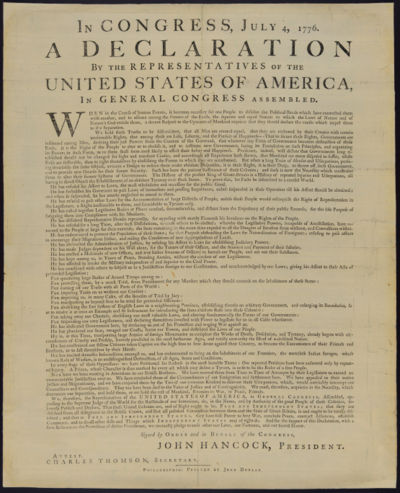U.S. Declaration of Independence
The Declaration of Independence, unanimously approved by the second Continental Congress on July 4, 1776, created a new nation, the "United States of America." It formally "dissolved the connection" between the thirteen states which had acted as the "United Colonies" and Great Britain. July 4 is still celebrated as the nation's birthday.
The "Declaration Committee," which included Thomas Jefferson of Virginia, Roger Sherman of Connecticut, Benjamin Franklin of Pennsylvania, Robert R. Livingston of New York, and John Adams of Massachusetts, was appointed by Congress on June 11, 1776, to draft a declaration in anticipation of an expected vote in favor of American independence, which occurred on July 2. [1]
The primary author was Thomas Jefferson, selected by Adams and Franklin because he was the best writer. Early drafts exist dating to June 1776.[2]
Voting was by states and the Declaration was not unanimous on July 4 but became so a little later. On July 4, the New York delegation could not sign since its instructions to do so did not arrive until July 9. The original title referred to Twelve States. Several delegates were opposed at first but later signed.
Signers
There are 56 signatures on the declaration of independence [3]
- Georgia
- North Carolina
- South Carolina
- Massachusetts
- Maryland
- Virginia
- Pennsylvania
- Delaware
- New York
- New Jersey
- New Hampshire
- Massachusetts
- Rhode Island
- Connecticut
Further reading
- Becker, Carl. The Declaration of Independence: A Study on the History of Political Ideas (1922), online edition
- Ellis, Joseph J., ed. What Did the Declaration Declare? Bedford Books, 1999. 110 pp. online review
- Middlekauff, Robert. The Glorious Cause: The American Revolution, 1763-1789 (2nd ed 2007) general history of the Revolution excerpt and text search
References
- ↑ Declaring Independence: Drafting the Documents. Retrieved on 2007-08-04.
- ↑ Transcription of the Fragment of the Composition Draft of the Declaration of Independence. Retrieved on 2007-08-04.
- ↑ Signers of the Declaration. Retrieved on 2007-08-04.
